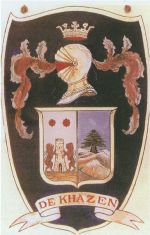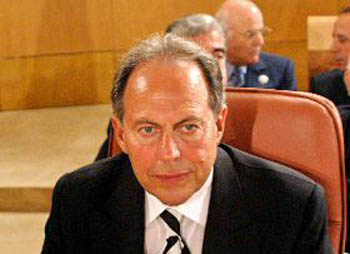
History
A Quick Note about the Khazen Family (An Introduction)
Written by Late Patriarch Boulos Massad, an Intellectual and Patriotic Man
Having we have seen that the Khazens were a main factor for Christians to be able to go back home in Keserwan, we decided to type this historical fact to keep it proven.
In summer 1922, we were able to trace in Saint Isaiah Abbey’s library (Which belonged to the Anthony fathers) literature written by patriarch Boulos Massad, titled: "Short enlightenment on origins of the honorable family, El Khazen". This literature was part of a book named ‘Al Dor Al Manthoum’. They were 10 pages from 301 – 310 and the manuscript was clearly and beautifully written. The man who was responsible for copying this brief note was Boulos Barhoush, a priest from Sahel Alman. He probably started copying this history before Massad was appointed a patriarch on 12 November 1854 and finished it on 22 March 1855, three months later as mentioned in last pages of the book.
"Al Dor Al Manthoum" was printed in Tamish Abbey in 1863 but this summary and other summaries written by the patriarch himself were not. We will add to this information, more information which we have discovered about Emir Fakhr Al Din and Cheikhs Abi Nader and Abi Nawfal, two brave heroic men who dominated this history indeed. This will fill the gap.
The crown Khazen family was born by the Maronite Chediak Sarkis El Khazen. This glorified personality lived in a village called Jaj in Mount Lebanon but following unknown circumstances and as time went on, he left his home in 1545 and moved with his family to another village called El Dar near to Keserwan but after some time, he moved again to another village called Ballouna in Ajaltoun, Keserwan. There he settled down with his children Abi Sakr Ibrahim and Abi Safi Rabah.
 AP, Romania’s decision to invite Lebanon’s prime minister to the Francophone Summit but exclude its president has sparked a diplomatic flap with France, which has supported the snub. It is the third time in 10 months that Lebanon has found its prime minister to be more acceptable at international meetings than its president, who is seen as having been imposed on Lebanon by Syrian influence.
AP, Romania’s decision to invite Lebanon’s prime minister to the Francophone Summit but exclude its president has sparked a diplomatic flap with France, which has supported the snub. It is the third time in 10 months that Lebanon has found its prime minister to be more acceptable at international meetings than its president, who is seen as having been imposed on Lebanon by Syrian influence.  Beirut is shaking off its war- torn past to recreate itself, writes Emma Levine. Beirut drivers have a dreadful reputation, even in the context of the Middle East. For every screech of wheels taking a corner too fast, there are a dozen cases of reckless lane swapping. Crossing the road is a visitor’s main challenge.
Beirut is shaking off its war- torn past to recreate itself, writes Emma Levine. Beirut drivers have a dreadful reputation, even in the context of the Middle East. For every screech of wheels taking a corner too fast, there are a dozen cases of reckless lane swapping. Crossing the road is a visitor’s main challenge.  Despite deep economic and political crises, Lebanon is facing an unprecedented property boom, spurred by the appetite of developers, expatriates and Gulf Arabs.The boom started last year despite dramatic events that shook the country, and which turned on the assassination of former premier Rafiq Hariri, with property prices soaring an average of 50 per cent.
Despite deep economic and political crises, Lebanon is facing an unprecedented property boom, spurred by the appetite of developers, expatriates and Gulf Arabs.The boom started last year despite dramatic events that shook the country, and which turned on the assassination of former premier Rafiq Hariri, with property prices soaring an average of 50 per cent. The Associated Press , BEIRUT, Lebanon
The Associated Press , BEIRUT, Lebanon  وقف البابا يوحنا بولس الثاني امس ببسمته الطيبة امام حشد من المصلين والرسميين الذين جاؤوا ليشاهدوا ازاحة الستار عن تمثاله البرونزي الجديد في حديقة كنيسة مار الياس- القنطاري. كان صدى كلمات ألقاها قبل 10 سنين تقريباً في المكان نفسه يتردد: "افهم قلة صبركم على الوضع اليومي الذي يبدو لكم انه لا يتغير(…). ان ما تتوقون اليه من تبدلات على ارضكم تلزمه اولا وقبل كل شيء تبدلات في القلوب. يعود اليكم ان تهدموا الحواجز التي امكنها ان ترتفع في اثناء حقبات تاريخ وطنكم الاليمة. ويعود اليكم بناء جسور بين الاشخاص والأُسر والجماعات. ان للشدة وقتا وللنور وقتا، وكل شيء يمكن ان يتغير (…)".
وقف البابا يوحنا بولس الثاني امس ببسمته الطيبة امام حشد من المصلين والرسميين الذين جاؤوا ليشاهدوا ازاحة الستار عن تمثاله البرونزي الجديد في حديقة كنيسة مار الياس- القنطاري. كان صدى كلمات ألقاها قبل 10 سنين تقريباً في المكان نفسه يتردد: "افهم قلة صبركم على الوضع اليومي الذي يبدو لكم انه لا يتغير(…). ان ما تتوقون اليه من تبدلات على ارضكم تلزمه اولا وقبل كل شيء تبدلات في القلوب. يعود اليكم ان تهدموا الحواجز التي امكنها ان ترتفع في اثناء حقبات تاريخ وطنكم الاليمة. ويعود اليكم بناء جسور بين الاشخاص والأُسر والجماعات. ان للشدة وقتا وللنور وقتا، وكل شيء يمكن ان يتغير (…)".